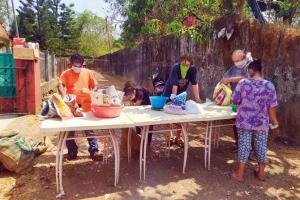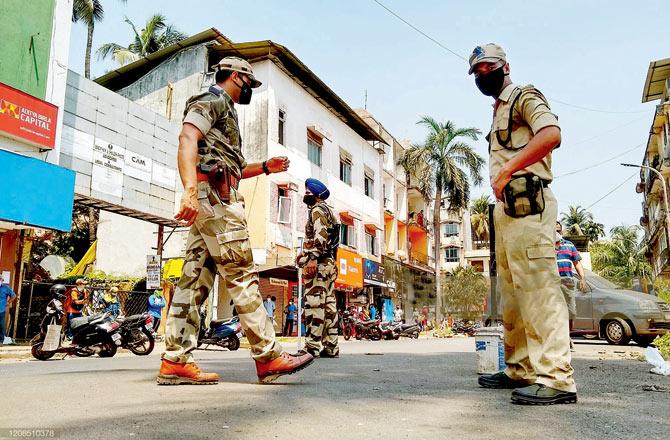Hitting the two-week mark of lockdown has been particularly hard for the sunshine state. With supply lines of essential goods choked, Goa-reeling under an entirely avoidable panic frenzy-is only just about finding its feet

Volunteers distributing essential food packets at Pequeno Chinvar, Anjuna
Before the rest of the country felt the first tremors of a lockdown, Goa had started proactively clamping down its borders. Unofficial notifications trickled down WhatsApp channels, asking for cautious movement in and out of the state. Janata curfew on the lazy Sunday of March 22 was marked with the clanking of a few pots and pans around the quaint villages. What followed was sheer chaos.
That night, a seemingly cautious Chief Minister of Goa Pramod Sawant, extended the lockdown for another three days through an order circulated on WhatsApp (followed by a press conference the next day), through which everyone waited for shops to reopen. The lockdown announcement came down hard on those who hadn't been out in four-five days, scrambling until 2 am to buy whatever was available. Wholesalers and suppliers stocked and sold, retailers hoarded and citizens scrambled. The week comprised incongruous notifications from the CMO. From a complete lockdown, to a non-starter home delivery system, succumbing to "public pressure" and reopening shops, to finally CRPF troops threatening errant residents looking for food. The state was driven to panic buying and hoarding in spite of there being no actual shortage. And soon, MLAs were instructed to coordinate with the panchayats to establish a supply system.
ADVERTISEMENT
While the situation today is infinitely better than a week ago, with many socially distant polka dots on shop entryways, it's been a rude awakening for most Goans.

Paramilitary soldiers patrol along a street during a government-imposed nationwide lockdown as a preventive measure against the Coronavirus pandemic in Goa on March 29. Pic/Getty Images
Allwyn Jorge, 47, sarpanch from Carmona, South Goa, says, "Breaking of a perfectly working supply chain mechanism is a moment of opportunity for hoarders and politicians. Wholesalers claim no stocks, say supply trucks are not coming through; MLAs siphon ration trucks to their own constituencies with zilla parishad elections on the horizon and genuine volunteers are not getting passes, which will help them access government rations and allow them to travel across the state. Lack of planning is evident at every level."
Without official communication and support, the small, family-run department stores have shut down. Now, unofficially, they are doing what they can to serve their local communities. "Black marketing has never been more severe in the state. Onions, potatoes are selling at between R80-100/kg, rice at R60-100 a kg. Everything is up by 50 per cent. Eggs shot up from R42 to R84 a dozen in three days," claimed a 52-year-old local wheat supplier, from Salcette district, asking to remain anonymous. Irking an MLA while the situation is still not under control is not something village communities can risk.
Almost entirely dependent on neighbouring Karnataka and Maharashtra, Goa's local produce is limited to an exquisite range of gins, whiskeys and feni, a few varieties of rice for self-consumption, local vegetables and fish. It relies heavily on Maharashtra for packaged food and dry rations and Karnataka for fresh fruits, vegetables, milk and meat. Goa Dairy caters to 25 per cent of the state's milk requirement. While other supplies struggled to trickle in, cereals and pulses were the worst hit.
Shaikh Salim, 40, a wholesale supplier in Margao, Goa's trade hub, says, "If people hoard supply, price hike is inevitable and cops lathi charge if we open the shop and a crowd gathers. I am forced to open shop for just two hours daily and supply to those who reach out to me personally. I have elders in the family, I can't control the crowds that gather outside and risk contamination."
While urban Goa, North and South, relies on supermarkets, wholesale markets, and on rare occasions a Zomato delivery, rural Goa has only its kirana stores and horticulture outlets to bank on. "Smaller vendors in villages [don't have the money to] stock pile like bigger stores. Panchayats don't have financial autonomy, we can only aid and coordinate. Without a political godfather, our village suffers," says Jorge.
While the panchayats in the South grapple with locals, those in the North have bigger fish to fry. Weeks ago, a construction and tourist hub, it now lies bare and hostile of its work staff, most of whom are immigrants from Assam, Chattisgarh, UP, Bihar and Bengal. As desperation peaked, local volunteers, young entrepreneurs and others who call Goa home, banded together trying to assist those in need.
Nupura Hautamakai, a 43-year-old Anjuna resident and part of a seven-member team of the Goa Humanitarian Volunteers, now 1,000-volunteers strong, is trying to reach across the state helping daily wage workers, out of work employees, housekeeping staff, cooks, waiters, gardeners, watchmen etc. "Panchayats across the North—Candolim, Calangute, Arpora, Chapora, Anjuna—are refusing assistance since they [daily wagers] don't qualify as a vote bank and are 'outsiders.' We hand out food to about 150 families daily, walking in the hot sun across villages. With phone recharge shops shut, they have lost contact with home. Fortunately, shelter at rented rooms or construction sites is still provided."
If survival of a jobless wage worker in an alien state is questionable, the urban elite are faring only marginally better. A 53-year-old entrepreneur from Calangute described their situation as dire, "After the first few days of absolutely no supplies, we finally sourced the contacts of those responsible for distribution in our ward who flatly refused to help, since we don't qualify as 'local Goans'. We had neighbours and friends in dire need, single mothers with husbands on ship, an 80-year-old couple, children with grandparents. We begged our sarpanch as we were sourcing for others in need, and were ultimately sent a kilo each of dal, sugar and rice, a small packet of Maggi and a box of tea leaves for R425. We moved mountains to get this 'care package'."
For the lucky few in and around Panjim, Taleigaon, MLA Babush Monserrate and his wife MLA Jennifer Monserrate took charge of stocks, affixed wholesale prices, created food packets and distributed them with the help of panchayat members. Department stores were opened and the constituents were happy. Curtorim MLA Reginaldo Lourenco says, "Mine were the first shops to get supplies. It started out cheap the first day, but by the third day, prices started shooting up with sugar going at R100/kg and tomato and onions at R100/kg. I did what I could. Maharashtra has a first time CM as well. We lack leadership and good relations with our neighbouring states. If things in Maharashtra escalate, we are doomed. We desperately need to work together now."
Ashish Kamat, president of United Goans Foundation, an NGO providing aid to stranded citizens, says, "MLAs are bending over backwards trying to appease their constituency. Clearing out one truck leaves other villages without stock. We're working round the clock to make sure supplies don't choke." With 10 volunteer passes and a few well-placed connections, they coordinated with wholesalers, suppliers and transporters to ensure supply in Margao and neighbouring areas.
Bureaucrats, local officials and some conscientious MLAs are trying hard to ease the situation, but after 15 days of disarray this is not an easy fix. Forty-six-year-old Sawant is the custodian of a trifling 17 lakh Goans. All the beguiling coconuts and beach parties can't hide the partisanship, hostility and inherent humanitarian crisis at play.
If remedial action of transport and labour isn't resolved, food supplies from source states get scanty, and what could have been a good opportunity for Goa to stock pile its reserves for upcoming dry days, will now spent in filling up a deficit that wasn't.
06
Number of positive cases of Coronavirus in Goa as of April 3
Catch up on all the latest Crime, National, International and Hatke news here. Also download the new mid-day Android and iOS apps to get latest updates
 Subscribe today by clicking the link and stay updated with the latest news!" Click here!
Subscribe today by clicking the link and stay updated with the latest news!" Click here!







